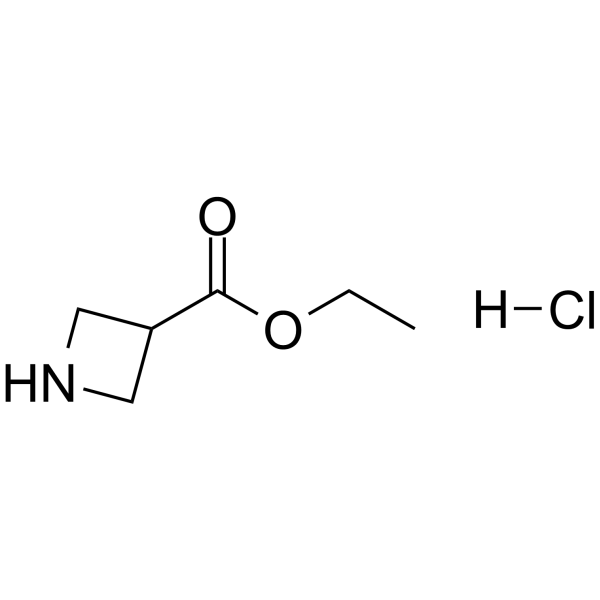Ethyl 3-azetidinecarboxylate hydrochloride (1:1)
Modify Date: 2024-01-16 21:30:18

Ethyl 3-azetidinecarboxylate hydrochloride (1:1) structure
|
Common Name | Ethyl 3-azetidinecarboxylate hydrochloride (1:1) | ||
|---|---|---|---|---|
| CAS Number | 405090-31-5 | Molecular Weight | 165.618 | |
| Density | N/A | Boiling Point | N/A | |
| Molecular Formula | C6H12ClNO2 | Melting Point | N/A | |
| MSDS | N/A | Flash Point | N/A | |
Use of Ethyl 3-azetidinecarboxylate hydrochloride (1:1)Ethyl azetidine-3-carboxylate hydrochloride is a non-cleavable ADC linker used in the synthesis of antibody-drug conjugates (ADCs). Ethyl azetidine-3-carboxylate hydrochloride is also a alkyl chain-based PROTAC linker that can be used in the synthesis of PROTACs[1][2] |
| Name | Ethyl azetidine-3-carboxylate hydrochloride |
|---|---|
| Synonym | More Synonyms |
| Description | Ethyl azetidine-3-carboxylate hydrochloride is a non-cleavable ADC linker used in the synthesis of antibody-drug conjugates (ADCs). Ethyl azetidine-3-carboxylate hydrochloride is also a alkyl chain-based PROTAC linker that can be used in the synthesis of PROTACs[1][2] |
|---|---|
| Related Catalog | |
| Target |
Non-cleavable |
| In Vitro | ADCs are comprised of an antibody to which is attached an ADC cytotoxin through an ADC linker[1]. PROTACs contain two different ligands connected by a linker; one is a ligand for an E3 ubiquitin ligase and the other is for the target protein. PROTACs exploit the intracellular ubiquitin-proteasome system to selectively degrade target proteins[2]. |
| References |
| Molecular Formula | C6H12ClNO2 |
|---|---|
| Molecular Weight | 165.618 |
| Exact Mass | 165.055649 |
| PSA | 38.33000 |
| LogP | 0.89970 |
| Storage condition | 2-8°C |
|
Material Safety Data Sheet
Section1. Identification of the substance Product Name: Ethyl Azetidine-3-carboxylate HCl Synonyms:Azetidine-3-carboxylic acid ethyl ester-hcl Section2. Hazards identification Harmful by inhalation, in contact with skin, and if swallowed. Section3. Composition/information on ingredients. Ingredient name:Ethyl Azetidine-3-carboxylate HCl CAS number:405090-31-5 Section4. First aid measures Skin contact:Immediately wash skin with copious amounts of water for at least 15 minutes while removing contaminated clothing and shoes. If irritation persists, seek medical attention. Eye contact:Immediately wash skin with copious amounts of water for at least 15 minutes. Assure adequate flushing of the eyes by separating the eyelids with fingers. If irritation persists, seek medical attention. Inhalation:Remove to fresh air. In severe cases or if symptoms persist, seek medical attention. Ingestion:Wash out mouth with copious amounts of water for at least 15 minutes. Seek medical attention. Section5. Fire fighting measures In the event of a fire involving this material, alone or in combination with other materials, use dry powder or carbon dioxide extinguishers. Protective clothing and self-contained breathing apparatus should be worn. Section6. Accidental release measures Personal precautions: Wear suitable personal protective equipment which performs satisfactorily and meets local/state/national standards. Respiratory precaution:Wear approved mask/respirator Hand precaution:Wear suitable gloves/gauntlets Skin protection:Wear suitable protective clothing Eye protection:Wear suitable eye protection Methods for cleaning up: Mix with sand or similar inert absorbent material, sweep up and keep in a tightly closed container for disposal. See section 12. Environmental precautions: Do not allow material to enter drains or water courses. Section7. Handling and storage Handling:This product should be handled only by, or under the close supervision of, those properly qualified in the handling and use of potentially hazardous chemicals, who should take into account the fire, health and chemical hazard data given on this sheet. Store in closed vessels. Storage: Section8. Exposure Controls / Personal protection Engineering Controls: Use only in a chemical fume hood. Personal protective equipment: Wear laboratory clothing, chemical-resistant gloves and safety goggles. General hydiene measures: Wash thoroughly after handling. Wash contaminated clothing before reuse. Section9. Physical and chemical properties Appearance:Not specified Boiling point:No data No data Melting point: Flash point:No data Density:No data Molecular formula:C6H11NO2.ClH Molecular weight:165.6 Section10. Stability and reactivity Conditions to avoid: Heat, flames and sparks. Materials to avoid: Oxidizing agents. Possible hazardous combustion products: Carbon monoxide, nitrogen oxides, hydrogen chloride. Section11. Toxicological information No data. Section12. Ecological information No data. Section13. Disposal consideration Arrange disposal as special waste, by licensed disposal company, in consultation with local waste disposal authority, in accordance with national and regional regulations. Section14. Transportation information Non-harzardous for air and ground transportation. Section15. Regulatory information No chemicals in this material are subject to the reporting requirements of SARA Title III, Section 302, or have known CAS numbers that exceed the threshold reporting levels established by SARA Title III, Section 313. SECTION 16 - ADDITIONAL INFORMATION N/A |
| Hazard Codes | Xi |
|---|---|
| HS Code | 2933990090 |
| HS Code | 2933990090 |
|---|---|
| Summary | 2933990090. heterocyclic compounds with nitrogen hetero-atom(s) only. VAT:17.0%. Tax rebate rate:13.0%. . MFN tariff:6.5%. General tariff:20.0% |
| Ethyl 3-azetidinecarboxylate hydrochloride (1:1) |
| ethyl azetidine-3-carboxylate,hydrochloride |
| 3-Azetidinecarboxylic acid, ethyl ester, hydrochloride (1:1) |